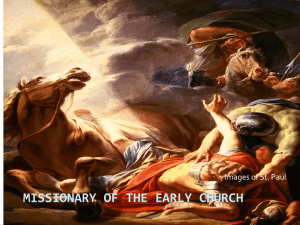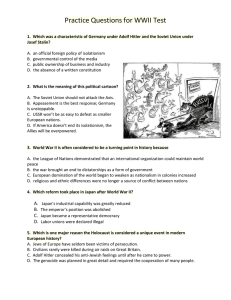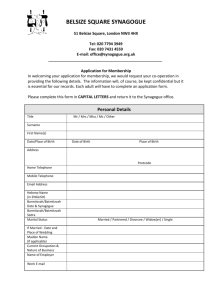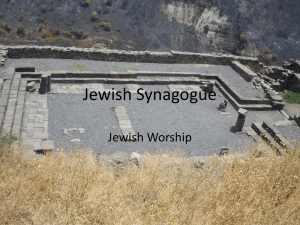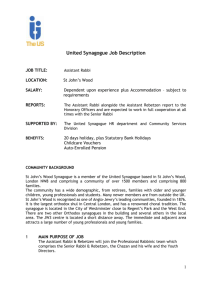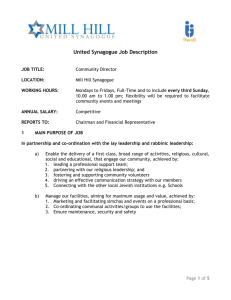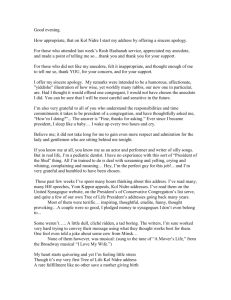Paul`s Strategy in 6 Cities
advertisement
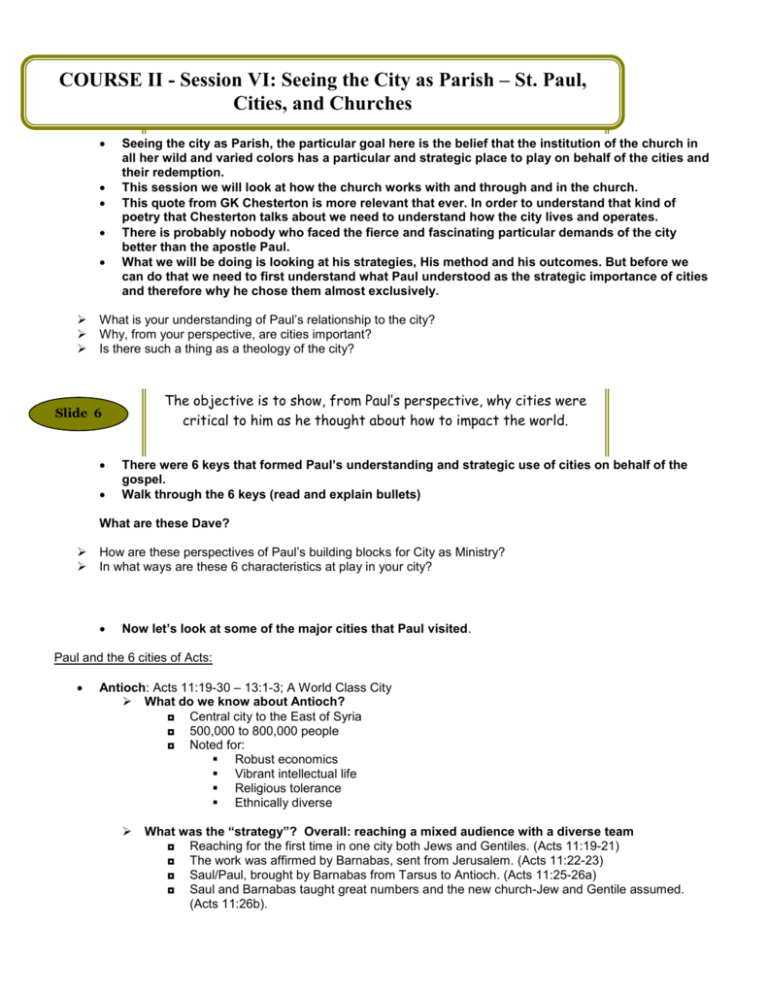
The instructor will use this slide to–show COURSE II - Session VI: Seeing theintroduction City as Parish St. the Paul, strategic focus of Paul in and around cities. Cities, and Churches Slide 5 Seeing the city as Parish, the particular goal here is the belief that the institution of the church in all her wild and varied colors has a particular and strategic place to play on behalf of the cities and their redemption. This session we will look at how the church works with and through and in the church. This quote from GK Chesterton is more relevant that ever. In order to understand that kind of poetry that Chesterton talks about we need to understand how the city lives and operates. There is probably nobody who faced the fierce and fascinating particular demands of the city better than the apostle Paul. What we will be doing is looking at his strategies, His method and his outcomes. But before we can do that we need to first understand what Paul understood as the strategic importance of cities and therefore why he chose them almost exclusively. What is your understanding of Paul’s relationship to the city? Why, from your perspective, are cities important? Is there such a thing as a theology of the city? The objective is to show, from Paul’s perspective, why cities were critical to him as he thought about how to impact the world. Slide 6 There were 6 keys that formed Paul’s understanding and strategic use of cities on behalf of the gospel. Walk through the 6 keys (read and explain bullets) What are these Dave? How are these perspectives of Paul’s building blocks for City as Ministry? In what ways are these 6 characteristics at play in your city? Now let’s look at some of the major cities that Paul visited. Paul and the 6 cities of Acts: Antioch: Acts 11:19-30 – 13:1-3; A World Class City What do we know about Antioch? ◘ Central city to the East of Syria ◘ 500,000 to 800,000 people ◘ Noted for: Robust economics Vibrant intellectual life Religious tolerance Ethnically diverse What was the “strategy”? Overall: reaching a mixed audience with a diverse team ◘ Reaching for the first time in one city both Jews and Gentiles. (Acts 11:19-21) ◘ The work was affirmed by Barnabas, sent from Jerusalem. (Acts 11:22-23) ◘ Saul/Paul, brought by Barnabas from Tarsus to Antioch. (Acts 11:25-26a) ◘ Saul and Barnabas taught great numbers and the new church-Jew and Gentile assumed. (Acts 11:26b). ◘ ◘ Prophet predicts future famine (1st time for this gift to be mentioned); congregation sends gift to Judea for their “brothers.” (Acts 11:27-30) Multi-ethnic pastoral team of prophets and teachers had formed and released Saul and Barnabas to a new mission (Acts 13: 1-3) Philippi: Acts 16:6- 40; Agricultural City (why else was this city strategic? Note connections that we have here with the book of Philippians (Jesus being an outsider/Phil 2:5ff) What do we know about Philippi? ◘ Central city for Macedonia ◘ Agriculturally based ◘ Latin What was the “strategy”? ◘ No synagogue ◘ Outsiders: Lydia (16:13-15) and fortune teller (spiritual) women (16:16ff) ◘ “Outside city gate” ◘ Persecution: 16:16-24 ◘ Miracles of power/deliverance for woman and then Paul and Silas from Prison ◘ Salvation and then Joy by jailkeeper (16:29-34) and powerlessness of Paul and Silas ◘ Paul and silas challenge the authorities misusing their power on them (v. 35-38) Omit in lesson: Thessalonica: Acts 17:1-9; Government City What do we know about Thessalonica? ◘ Capital of Macedonia (County Seat) ◘ Named after sister of Alexander the great ◘ Jewish colony, ◘ important trade route: Egnation Way What was the “strategy”? ◘ Synagogue: existing religuous structure. ◘ Reasoning and debating. Explaning, persuasion. Athens: Acts 17:16-34; Cultural City What do we know about Athens? ◘ Capital of Attica ◘ Seat of Philosophy, learning ◘ Greek What was the “strategy”? ◘ ◘ ◘ ◘ ◘ ◘ Museum tour Paul distressed about idol worship (v. 16) Synagogue: reasoned with Jewish arguments-less key here (v. 17) Marketplace: business, everyday life. Areopagus: listened, reasoned with allusions with their thought, poetry, god. (v. 18ff) Corinth: Acts 18:1 -13; Industrial City (connections to 1 and 2 Cor? see….) What do we know about Corinth? ◘ Capital city of Achaia (key role of capital) ◘ City of commerce ◘ Proverbial for sexual laxity What was the “strategy”? ◘ Priscilla and Aquilia and tent making; no burden on others ◘ Blended in with common folks ◘ Synagogue on Sabbath: reasoning with Jews (4-5), abuse (v. 6), Paul decides to not reach Jews but Gentiles/focus, reaches 2 key people (one jewish leader and one God fearing Gentile) who then reach their oikos/circles of influence/relationship. ◘ Persecution (vv. 12-13) Ephesus: Acts 18:18-19:41; Power City (WHAT Can we learn from Ephesians here?) What do we know about Ephesus? ◘ Key to Asia (why)-location, worship, economic, cosmpolatin, ◘ Known to be a learning center for Magical spells ◘ Center for Artemis (virgin hunter) ◘ What was the “strategy”? ◘ ◘ ◘ ◘ ◘ ◘ ◘ ◘ ◘ ◘ ◘ Key uniquenesses: Spent longer here, Team, contrast of power 18:19-26: Paul teaches at synagogue, reasons and then leaves work with P/A. Apollos begins to teach powerfully but misses Baptism of HS. P/A correct him. 19:2-7: Pauls finds disciples and asks them about/helps them receive HS. v. 8 Synagogue again reasoning, persuading. Theme: kingdom of God (same word used later, too) v. 10: all in province, Jew and Greek, hear of God’s word. v. 11-13 Miracles of power: sick and demon possessed v. 14-17: contrast of an evil impostor being powerless against demons makes the god of Paul look greater, his authority clearer, awe and reverence from crowds. v. 18-20 People repent from their idols, burn books on magic. make economic impact on town as well. v. 23-27: Those who hoave much to lose economincally stir up crowd against Paul /Gospel. Bring in Paul’s partners (2 more new folks) and then townclerk speaks up, dispels crowd. Ch. 20:18-35: Paul’s final speech reveals muich abuit hios strategy: life was an example, very close to those who worked with, tears, humility, testing, bold, taught all of gospel, and of other teachings: thorough! house to house. Wanred leaders. Supplied his own needs. Challenged them to helkp the poor/weak. School of Tyrannus?? Narrative of Urban Impact Having at your disposal a variety of methods that can be calibrated for the city you serve is one of the key strategies to effectively work and minister. Read through bullets Antioch o Strategy – Multiethnic pastoral team Philippi o Strategy - No synagogue, Lydia and women, “Outside city gate” Thessalonica o Strategy - Synagogue Athens o Strategy - Museum tour, synagogue, marketplace, Areopagus Corinth o Strategy - Priscilla and Aquilia and tent making Ephesus o Strategy - Synagogue, school of Tyrannus


